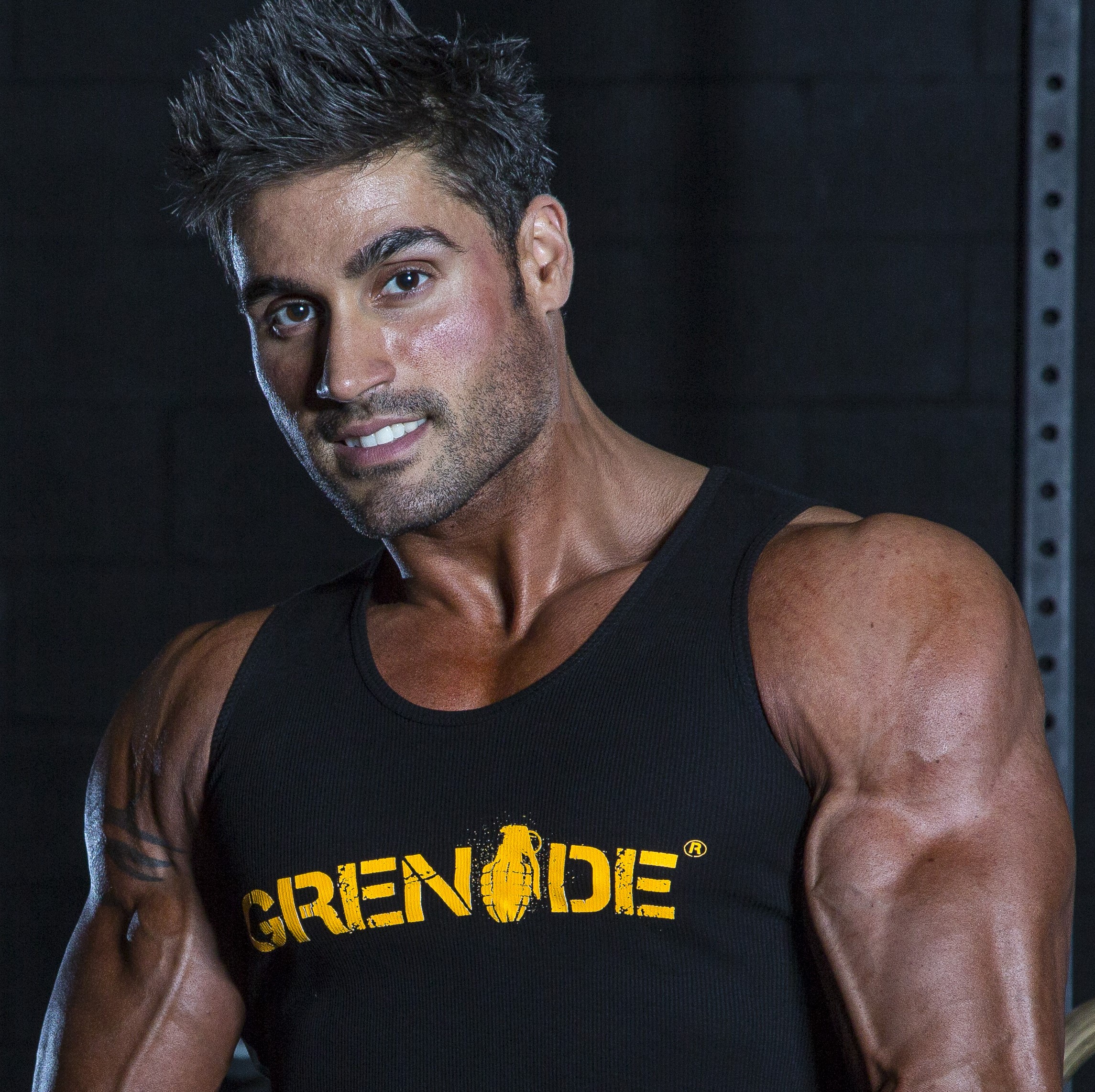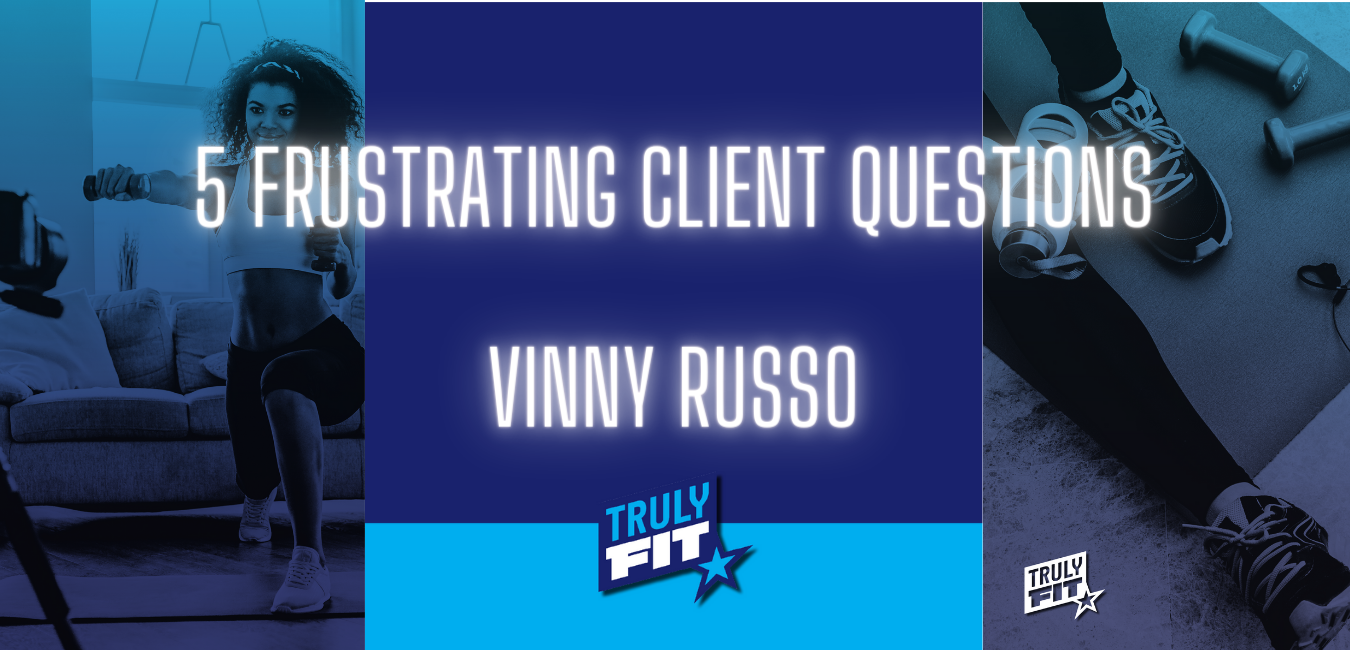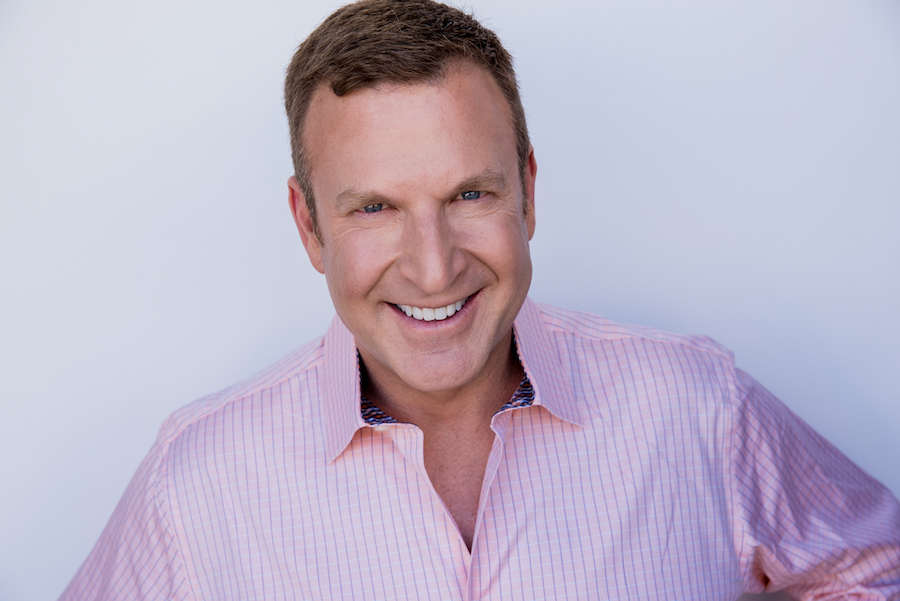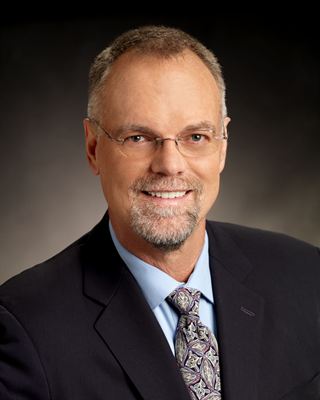
5 Frustrating Client Questions : Vinny Russo

Guest: Vinny Russo
Release Date: 10/17/2022
Welcome to Trulyfit the online fitness marketplace connecting pros and clients through unique fitness business software.
Steve Washuta: Welcome to Trulyfit. Welcome to the Trulyfit podcast where we interview experts in fitness and health to expand our wisdom and wealth. I am your host Steven Washuta, co founder of Trulyfit and author of Fitness Business 101.
On today’s podcast I have on longtime friend of mine, Vinny Russo. You can find him on Instagram at Vinny Russo underscore WP F F Pro or Vinny russo.com. Vinny is just as stated before through his Instagram, a WB FF Pro, that’s a bodybuilding pro. He also has his master’s in applied clinical nutrition. So he is a nutrition coach. He works with clients, both from the fitness and nutrition standpoint, and I thought he’d be the perfect person on for this episode, which is five frustrating client questions because these questions involve both nutrition and fitness.
And these are questions that I would consider that the general public asks on a regular basis to their fitness and health and nutrition professionals. And we have to know how to respond accordingly to these questions. I asked a few of these to dr. mark on the last episode. And then I came back and asked Vinny to sort of expand on these questions and asked him all five where Mark only got three of these.
And I might start doing this more often I might start giving these general questions that we get a lot from clients, and asking other professionals in and around my industry, how they answer those questions, which gives us better insights into maybe what we’re doing wrong or what we can add to our answers.
It was a fantastic conversation with Vinnie, I’m sure I’ll have him on again, discussing other fitness and nutrition-related conversations we did at the end talk about his program and the things that he does, which I think people can take up a lot of cues from to build your business appropriately and scale. It was great conversation with no further ado, here’s Vinnie rizona Rooney, thanks so much for joining the Trulyfit podcast wanted to give my audience and listeners a little bio background on who you are and what you do in the health and fitness industry.
Vinny Russo: Steve, thanks, man, longtime since we actually hung out, but good to hear from you, man. And thank you for having me on your podcast. So just a brief, I’ll go through it pretty quickly. So basically, I have my master’s in applied Clinical Nutrition, and I have been in nutrition coach for the last 11 years. I own a company called TPR, PR staff My name video, so or you could just say hurtful results, whatever, however you want to spin it, that’s up to you.
Basically, I take clients on and I started off with bodybuilders and I got away from that just took a lot of time. And it’s a very niche category. But my heart was really trying to help people and overall health. So I went more towards the general population. And I find a way more rewarding to be able to give back people their vitality and quality of life, improve their bio health markers, and help them get to the to the physique that they’re striving to be.
And I do that mainly through nutrition movement protocols, and if they need exercise programs together for them as well. But that’s my passion, man. And I’m glad that I’m able to do something with my life that involves that passion. So I am a WPF Pro as well. So I practice what I preach. And I compete probably once or twice a year. And yeah, that’s basically it.
Steve Washuta: Yeah, it’s going to the general population, there’s like it’s a gift and a curse, it’s so much different because it’s great. They probably are, you know, there’s more to work with meaning like if someone is 40 pounds overweight, and they’ve never ate good before they don’t work out like you can start to see like their goals come quicker.
But the harder part is that different from like your original niche is that your original nice, people are so dedicated, right? If you’re a bodybuilder, you’re waking up at all these like weird hours, and you’re eating whatever you have to and you’re training three times a day, where the general population is just different working with them, because they don’t have that sort of willpower.
Vinny Russo: It’s definitely a different animal. But what I love about the general population is that I’m an educator at heart. So I’m able to teach them a lot more than bodybuilders they come into it with a pretty good foundation of knowledge. The general population sometimes don’t even know the difference between carbs, proteins and fats and not that there’s anything wrong that they just haven’t had an interest or just what we’re never taught it.
So being able to educate people and have them give them a better understanding of nutrition in general. It’s it’s something that I’m passionate about. And so it is two different animals. And like I said, I just kept more rewarding feeling focusing on someone’s health, giving them energy to play with their kids, you know, making them look like they’re the old high school college days. Oh, and after they had kids they want their their pre kid baby pre kid potty back. So it says more rewarding in that aspect than putting a pedal around some
Steve Washuta: totally and you know, personal trainers. It’s hard sometimes for us and we’re gonna get into this year when we get into the conversation to get people to reach their goals because we really don’t control their diets all the time. A lot of personal trainers feel like that is above their pay grade.
And it’s just something they shouldn’t touch. So they don’t really delve into that. Whereas in your you really have that full spectrum of being able to oversee both of their, their workout routines and their diet. And that’s really why I wanted to have you want to go over some of those questions that we as personal trainers get, we don’t always know how to respond to our clients.
So we’re gonna go over five questions that personal trainers often get that a lot of times involve nutrition, that we don’t know how to respond. So the first one out of the gate, I’m sure clients ask you this all the time videos, is fruit bad for me? How do you respond? And don’t just respond to me? Somebody who already knows the answer, but to the general population? How do you explain that?
Vinny Russo: Well, the first and foremost, the first thing I would say it’s a Why do you think food is bad? Right? Normal responses used to be well, but what they get for as long as natural sugar, right, it’s naturally occurring.
But the amount of vitamins, minerals and phytonutrients that you get with food, especially the fiber aspect of it, the water content, right for hydration, it’s like you want to keep that in your diet, the antioxidants alone, my favorite thing to do is go with blueberries, because blueberries are so high in antioxidants, I usually throw in everybody’s plan.
But yeah, so usually when people ask me, it’s true, that it’s not, right, because the amount of fiber phytonutrients, micronutrients, and minerals and vitamins that are involved, they outweigh the consequences of any type of overload with sugar that you would get from fruit. I mean, if you’re talking about fruit juices, I mean, the fibers removed and you drink, you know, four glasses of, of orange juice.
Compare that to try to eat for oranges, it’s a lot harder because of that fiber content. So I’m my little thing is fruit is good for you. You want to keep it in your plan. It’s good for the body. So just make sure you have it in there. And if you think it’s wrong, because of the sugar, you’re not, you’re not totally off because you are being cognizant of sugar content. But just understand that fruit has more to offer than just sugar.
Steve Washuta: Yeah, that’s a great answer scientifically. And I think what you actually just what you started with is why are they asking you that is an important thing to question both the client and yourself because a lot of times they’re asking that, because they want permission, meaning they’re already eating fruit, and they think they’re doing something wrong.
So you have to tell them like, No, you’re not doing anything wrong. It’s okay. You have permission here to eat fruit. And I think that’s a lot of times when questions are asked because they want permission.
Vinny Russo: That no, you hit the nail on the head with that too. And the reason for that is obviously because there’s so much conflicting information out there with, you know, eat liver and testicles, or just a vegan diet, you know, like to complete ends of the spectrum. And everyone’s throwing this all out to people.
And it’s all on social media, there’s so much conflicting information that people get confused, right? So you just want to make sure that if you do have a question, have someone that actually knows a little bit of what.
Steve Washuta: So the next question here is, why can I gain muscle, but let me unpack it more, because this is every client’s goal, they come up to me, and they say, Hey, I’m looking to lose 10 pounds of body fat and put on 15 pounds of muscle.
And it’s like, well, those seem to be conflicting goals. Can you explain why, in layman’s terms, it’s really impossible to be losing a ton of body fat while gaining a ton of muscle?
Vinny Russo: Yeah, so simplistically, put, in order to lose any type of tissue, you need to be in a calorie deficit. In order to gain any type of tissue, you need to be in a calorie surplus right. Now, unless you are a newbie, a newbie gains while being in a deficit, because of the stimulus that the gym is causing the resistance training, actually ignite growth.
So where’s the optimal, optimal growth? No, because you are in a deficit, but it still be growth because of the new begins, or if someone’s on here, right. So if someone’s on peds, they can have the ability to be able to grow while on the deficit as well.
But the underlying concept is the calories right? So if you’re trying to lose body fat in a deficit, which means that trying to gain muscle tissue, it’s more difficult just because you don’t have the calories supporting that muscle growth.
Steve Washuta: For an offshoot of that question, do you find it difficult to convince clients and I’m saying this almost as in a leading way, because I do, who are trying to not lose weight who are trying to gain muscle to eat more, because it seems just counterintuitive when people are trying to get in shape.
They don’t always want to eat more. They think they just need to eat healthy, but they don’t get that they need to be in a caloric surplus. Do you have trouble convincing people to be in a caloric surplus?
Vinny Russo: Well, usually what I say is trust the madness, right? So even when people go into a deficit with you, when you first start off at night, I feed them up pretty heavy, and they start to lose because the body likes homeostasis. So we put them on certain calories to have like an ISIL cord, which means basically you’re having the same amount of calories day in and day out.
So the body likes homeostasis, so it starts to adjust to it quickly and then they start dropping eating more food than ever So initially, even with going into report surplus or clients, because they’re not used to the systems, because they’re not used to fueling the body the proper way, they initially start to lose even in a surplus.
And it’s like, whoa, like, how is this happening? I’m like, That’s interesting man, as we just got to add some more food, because we’re a little bit below your means right now. So yeah, is it hard to convince them? It’s more or less listen, you reached out to me, to help you out. So trust what I know, man. And if you got questions, ask them along the way. So I can explain it to you.
But convincing now, I mean, I love feeding appliance, it’s my favorite thing to do. Because I have to have some clients struggle, you know, and they’re not obsessed with the scale. And it’s just an easier process for me as a as a coach than it is for than it would be for bringing people down into a deficit and haven’t go through the hunger phases and stuff like that. But convincing-wise now, it’s more like this and just trust the process. And just ask as many questions along the way.
Steve Washuta: Yeah. And I mean, when someone like you, they should, they’re going to notice if they’re working with you, you’ve been there done that, right. They know your background, they’ve, they’ve seen your pictures, they know that you’ve been on stage before, and they know that you know what you’re doing.
And I think there is a big component to that with coaching from like a psychological perspective, like just knowing you can put your guard down, relax, and just follow a plan and not have to question everything. And I think that’s a, that’s a benefit. To have someone like you who’s been there and done that, where, you know, there’s a lot of people who are new to this industry, and they just got their first like certification, they start trying to give out this advice, and people kind of sniff the bullshit, so to speak, right.
And they know that like, this person, just read this online yesterday, but they don’t really have, you know, they haven’t had dozens and dozens of clients who’ve had success. And I think that’s, that’s also
Vinny Russo: another problem. Yeah, and that’s, I find that an issue with personal trainers watching, especially just starting Well, it’s getting the trust from the clients, because they’re not seeing any results from them, because they didn’t have the experience yet. But it’s like, and when I first started off, it’s kind of like, you just go with the flow, man.
That’s it. And I told people, Hey, but we’re going to do this for free, just so I could get some results underneath my belt. No. But yeah, I mean, but when you if you’re just starting off as a personal trainer, it’s a lot harder to convince them like you know what you’re doing and know what you’re talking about, compared to someone like me, who’s been in it for over a decade and have the results behind it.
Steve Washuta: Next question here that clients ask all the time, in these five frustrating client questions, how do you respond to clients that come up to you Vinnie, and they say, Hey, I want to look cut. So I’m only doing high repetitions? What is your response? How do you work with them?
Vinny Russo: Well, once again, I’m asking them, well, why are you doing that? Like, what’s what’s, what’s the reasoning for why like, Why do you think that that’s going to work? And you say, Oh, well, people hire reps, you know, lighter weight, you’re burning, you feel the burn, and, and you’re doing more reps, and you’re burning more calories.
And it’s kind of like, yeah, you might have a point there. But in order to actually look better, and get cut, you want to add muscle tissue, right? So we want to have enough stimulus to to add muscle tissue to make you more metabolic, which means you’re just going to burn more calories at rest. So I tried to push them that way to where it’s more about the intensity in the gym than it is so much, high reps, or low reps, because you can have crazy intensity with lower reps and work on strength and building.
Or you could have crazy intensity with high reps and still work on building. But the foundation is going to be the stimulus that you’ve had in the gym, and that causing the growth of muscle, because that’s going to make you burn more calories at rest. Which overall. Yeah,
Steve Washuta: that’s a great answer. And yeah, we explain it like we’re trying to break down muscle fiber, there’s different ways to do it. Yeah. Can you do it through high rep? Sure. We want to break down and build stronger, but ultimately, we need to build the muscle to if it’s not there, and how do we build the muscle, we have to challenge the muscle by increasing load.
And I think there are some people who hesitate to do that. They just, they it’s one of those weird misnomers in the industry. It’s just been passed around for like, honestly, like generations, I feel like when we were kids, they were talking about that, like, we were probably taught that in high school, and even before high school that you have to do heavy reps to get lean. And I think that just it’s just embedded in everyone’s mind.
Vinny Russo: Yeah, and I see this a lot with females not not to say that, you know, anything against females, but just going in there with that mindset of I’m gonna grab a 10 pound dumbbell on your shoulder precedent and do 1520 reps and not really feel anything and thinking that I’m doing something. It’s just It’s a common misconception. And they’re like, a lot of female say, Hey, I don’t want to get man shoulders.
I don’t want to have tracks I don’t want to look like a dude. You don’t have the hormones going on throughout your body in order to cause that. So technically, when you do train, not that I’m trying to make this dichotomous with males training this female training but she males need to train like males, like just, we also train the same.
Because muscles muscle, right, and without those hormones going through your body, you’re just gonna get the muscle tissue, you’re not going to get big and bulky. So they’ll look better training like men, and we’re going in there doing really, really extreme reps with no, no burn, intensity, intensity, male or female.
Steve Washuta: Everyone always asks, when they first start out, they look for all the different diet mediums they can take. Typically, at some point, they go down the Keto rabbit hole, and they come to the fitness professional or the health professional of some sort. And they go, I need to cut out all carbs to lose weight. What do you respond?
Vinny Russo: First thing I asked him Is do you like carbohydrates? And if they say yes, I’m gonna say, well, we’re not cutting them out then. And then I’m gonna go into why. So they’re under the assumption that cutting out carbohydrates to lose weight, because maybe they did it for a little bit, didn’t lose weight. Or when you go into the science behind and explain that look, cut out carbohydrates, carbohydrates during the body as glycogen, for every one gram of carb, three grams of water need to be stored to create glycogen.
So when you initially cut carbohydrates out, what you’re doing is you’re losing a lot of water weight, which is why the scale weakens down, it is losing body fat, just you’re still waiting for them because you have less mass on you because of the loss of water and the loss of glycogen. And sooner or later, what happens is you stall out.
And then it’s like, well, what do you do from there? If you’re ready to cut out carbohydrates? Where are you going to go? Which is why ketogenic should be a tool, not not a way of life, not a diet way of life? And in my opinion, especially if the clients are like, Yeah, listen, I love like, I really like carbohydrates. I like bread. I like pasta, I like rice. Alright, well then don’t cut it out why you’re ruining your quality of life, to try to lose some poundage on the scale that’s only keeping water anyway.
So it’s really about taking into consideration the client’s preferences. If there’s someone who’s just like, yeah, I really just don’t like carbs, or they can’t have them for a specific diseases or anything like that, then it’s kind of like, well, we could scale them back and not having the nerve, we could still probably have fruit and vegetables. But if you’re really not a fan of rice, potatoes, bread, any of that stuff, like we don’t need to have a plan. But if you’re trying to grow, and you’re trying to build muscle tissue, it’s not. And I make sure that that’s known first.
But it’s really just like spending them initially like, Hey, this is the reason why you lost weight, if you could try it, or this is the reason why people say it’s great to lose weight when on a ketogenic diet. You’re losing Skidaway Yes, but you’re not losing body fat. Like I said, the only way to lose body fat and make sure that you go into a deficit.
Now, if people aren’t doing the ketogenic diet, and they are in a deficit, yeah, they’ll be losing water. You’re using like gym, but there probably was a little bit about high fat too. But you could do that by going into a deficit without cutting out those carbohydrates completely. Yeah, and
Steve Washuta: there’s been a theme to this. And all of these questions you’ve responded with, I asked the client first why and I think that’s important. Because most of the responses that I think I would get is, Well, I think I can lose weight quickly doing this, and everyone wants to find the quickest way to do things.
And then we have to respond as fitness professionals, and I’m sure you do as a nutrition and fitness professional that. You know, speed is not the goal here. Nothing beats consistency, you can do whatever you want over time, the reason why Vinnies and shape is. Because he’s dedicated 15 to 20 years of making healthy choices and healthy habits, right? We’re not trying to do this quickly. We’re trying to be sustainable over the course of a long period of time to get you to your goal.
Vinny Russo: That’s exactly what you said a key word and sustainable, right. And it’s not just about Sprinter van getting as fast as possible, because getting there as fast as possible. It’s not as efficient as possible, right? And with efficiency, cons sustainability. So building those habits over time, that’s why I require a six month minimum, if needs because change takes time.
I gotta teach you habits, I gotta answer all your questions. You have to learn this stuff, you have to understand how your body works. You got to see what foods work really well with you and that. You don’t really respond to get to see what kind of diet strategies you respond to.
Right? So change is going to take time. It’s not about how fast you get to that end result. Right? It’s about the journey along the way and what you’ve learned from that journey. So take your time with it and don’t look for the fastest way look for the most efficient way.
Steve Washuta: Question five, hear from clients, frustrating client questions. Do I have to cut out alcohol to get to my goal? How do you respond to clients who bring that question?
Vinny Russo: I say that if alcohol sustains your quality of life. then you should keep a little bit in. Because once again this needs to be sustainable and quality of life is big with me and making sure that you’re happy. But just understand that salts will be hindered from alcohol, they will be useless calories, seven calories per gram alcohol.
Yeah, you could drink your pocket and club but still having those those Apple calories and the edible all the time. Especially if you get drunk in that inhibition goes and then you start eating the top The problem with that is that like alcohol is a prisoner to the body. So what it’s going to do is it’s going to hold the metabolism food. Because it wants to metabolize alcohol and get out of the body as soon as possible.
So now you’re drinking, now you’re eating on top of that alcohol that foods can be wait to be broken down. it’s going to store. So what you want to do is, if you’re gonna, if you’re going to drink. Try to fit it into your plan, somehow try to fit those calories, at least into your plan. And one easy way to do that is cut down fats, because fats are very dense. So you can cut out a decent amount of fats, and get away with adding these calories in. But if you want the best results possible, and yeah, going like sober, October is the best thing to do.
But once again, if it is part of your quality of life, where you’re like. Hey, I got to have cheap glasses of wine with my wife on the weekend. So be it, have it in there. And just plan ahead, like with me, with my clients s for six out of seven, six out of seven days of the week. To try to be as onpoint as close as possible. Because that over time consistency, six out of seven days a week, over a six month period. You’re gonna see how it results. So can you fit it in? Yeah. Is it ideal? Not if you want the best results?
Steve Washuta: Yeah, I imagine if you’re, you know, I know you don’t do this much anymore. But if you are working with somebody who’s going to be on stage, it’s a completely different conversation, right? If you’re just working with, you know, Johnny regular, who is 53 years old. and he you know, works at the desk, and he comes to you three days a week to do a little bit of personal training and form his diet.
He doesn’t have these like, large looming goals where he has to have a certain percent body fat. He’s just trying to become a healthier human being. Yes, of course, you can deviate from that, as opposed to somebody who’s saying. hey, gotta get on stage in six weeks. It’s like, Well, every little thing matters at that point. So like, like you, we have to be mindful of what you’re doing. Yeah, no,
Vinny Russo: it’s two different conversations, two different animals completely. If you’re stepping on stage, if you’re a competitor with me. It’s like I want to uncle, there’s Well, what what, are those calories going to be useful in anything that we do? And no, they’re not. So you know, we’re going to come out, we’re not going to have that in there. If you’re stepping on stage, like, like you said, general population.
Like, if it’s a standard quality of life. having it in there just can’t be excessive, might have to take it down from Hey. If you’re doing it three nights a week. I have to take it down to two and take it down to see those best results possible.
Steve Washuta: Yeah, I think that’s, that’s exactly what explaining to them, what is going to happen. What happens in their body from a scientific perspective could certainly help people maybe dial that down a little bit. Because some people just don’t know, they don’t want to know exactly what’s going on in their bodies.
And then also, you know, from our perspective, personal trainers, I don’t care if my clients drink necessarily. But I, if they came in, and they weren’t of 100% ability to work out that day. they would notice a change in my demeanor, because then we can’t get the things done that we need to get done. Right. So like, why are you calling 8am? If you’re out drinking the night before, and now we can’t do anything that we needed to do. It’s like, you’re just you’re wasting your money, and you’re wasting my time.
Vinny Russo: Yeah, yeah. I mean, yeah, that’s a different animal on its own. when you got to see them and actually put them through a workout being hung over. Yeah, that’s just there’s got to be accountability there too, which is why we coach them, right? That’s, that’s it, that’s part of that life.
And initially, starting with them, they might not have that system down. But then sooner or later, after a couple of sessions where you make them throw up. They’re probably not going to come drink the night before triple session.
Steve Washuta: So tell me a little bit about your current business model. You said you’re coaching general population people, are you doing everything virtually? Do you work with people also in the in the gym realm? Are you like looking over their, their daily routines? Are you specifically doing nutrition? What exactly does a client of yours go through?
Vinny Russo: Yeah, it’s about 85 to 90% on Nutrition, and movement, right? So I do a lot of power walks a lot of walking after meals, but you’re controlling for digestion purposes. I do a lot of I don’t do a lot of cardio in terms of like. Hey, we got to do five times a week at 45 minutes. I’m not a big fan of cardio. As as a way to get caught expenditure on it’s more just a tool to help. And then workout programs I just program.
But I do have some clients, some clients in my area that come and actually train with me in person. So that’s just specific training. We don’t really talk that much about nutrition because they get enough from me about nutrition throughout the week. But yeah, I’m in person personal training, select clients. And the main part of my program is on nutrition. With like I said, because I’m a big believer in walking. So
Steve Washuta: are you checking in with clients from like, virtually, or phone calls or in person? So if you write somebody out a program. Let’s say I become a Vinny Russo coaching client, and I say Hey, Vinnie, my goal is to gain six pounds of muscle over the course of the next six months.
I want this was my workout routine. I have my own personal trainer, I need you to write my diet out. Are you checking in with me weekly? How does the process go? How do you work with clients?
Vinny Russo:Yeah so there’s multiple touch points with me throughout the week, the main touch point is going to be the one weekly check in and have to do so I work with Google Forms and Google Sheets. So they’ll click on that link to the Google Form to fill it out. And that gives me their feedback on under biofeedback, right? So I go through that through the tracker where they’re keeping track of their steroids and Risa conference.
And that gives me data to be able to use to manipulate the diet bandwidth. But they also have access to my boxer boxers walkie talkie yet. So a had a question. They have any concerns that need to change because they ran out of food or whatever. it just hit me up on boxer. And it’s the same our response that I give them. There’s also three touch points within the Facebook group that I have, where we do stuff together.
I have a client experience coach who reaches out twice a week. To each client. Just to see how they do and see if they need any support or anything like that. And, yeah, the main thing is going to be that boxer. So I tell my clients, listen, you’re never going to ask me a stupid question. Your pet, you’re investing in me to get you to where you want to get to. So make use of it, and just ask as many questions or as possible. And if you’ve got concerns, just make a note.
Steve Washuta: I love that. Yeah, I love the Voxer inside of your business model. Because I feel like too, it could be its own part of the business there. Like there’s tears to charging people, right. So maybe you maybe there’s some people who just work with Vinnie, like in a concierge fashion where it’s like, okay, if. If you want to hit me up on Voxer, and you pay whatever, $100 a month, you always have access to me, I don’t write out your plans.
But if you want to hit me up and be like, Hey, I’m between this option and this option. What should I do? Think that could be its own business model. Right. So it’s so cool to be able to have like that one on one communication. I think some some people who, who have businesses who haven’t done that thing, people are going to take advantage.
That’s typically not the case, people that you can speak to those people aren’t just messaging you 50 times a day. And expecting immediate responses.
Vinny Russo: No, no, they’re not. And the thing that I left out too is when they do their check in, I do a video feedback. And that’s like the main form of our communications where like, I’m going over everything that I see with the clients through their tracker through their check into the biofeedback and I’m explaining to them. Basically what I’m looking at, right, so they have the tracker in the background, they have their checking in the background, and my face is on the screen, and I’m talking to them going over everything that I’m looking at and explain why I’m looking at it.
They want to make manipulations. I tell them why we’re making this migration. And if we’re not explaining why we’re not doing that, right. So that’s like the main thing. And that answers a lot of the questions throughout the week. Because in their checking, I’m like, Hey, do you have any questions that you have for me?
And they’ll ask it there, and I just answered on the video. But yeah, that box or there might take that business model, where it’s just like. It’s a price ticket to where it’s like, hey, just in case you need nutritional guidance, like here’s my box, yup, this is what you pay per month.
Steve Washuta: Especially if it’s not like immediate if you’re like, hey, I’ll respond within 24 hours. I think that’s like, it’s a good way to have like a low ticket. Like you said, if for people who just don’t feel like doing it. Or maybe who clients who have almost like graduated out of your program, they know what they’re doing. But they still want to keep in touch. It’s like okay, well, like here’s a secondary, like, low ticket thing. So we can still keep in touch.
And just just to touch on what you just said. I think Daniel de Brock who was on mentioned, he does the same thing. I think it’s such a good idea that a lot of like what I used to do. when when I had like a lot of virtual clients is I would meet with them live one on one but it’s really hard to like get everyone’s calendar schedules ready, right I run like two or three different businesses I personal train, I have a child, they do stop, they have worked.
So just to be able to video record yourself on screen looking over their sheet and talking to them as if they were really there and being like, you know. John, it looks like here on Thursday, you skip lunch and dinner, what’s going on? Our goal is to get you to 20 100 calories a day. We can’t do that skipping lunch and dinner, right? To be able to do that. lets them know you care, and also frees up your schedule and your time.
Vinny Russo: Well, that That’s it, man. It’s efficient, right? So that’s the key thing. It’s like, I have right now seven new clients. So our check ins on different days, and I haven’t even before a specific time, right. So then I know everyone on that day has a time. I spend my time on that day to go through each one and do all the video feedbacks. And what it is, it’s efficient for me. Because I do make sure that they have it in nice and early side the rest of the day.
But it keeps that personal level, right? Because I’m talking to them directly going over their statistics or data directly to them. So it keeps that personal touch there where if you’re just doing like an email or a text message, or even like a voice memo. They’re not looking at your face, so it takes away from that personal touch.
Steve Washuta: Yeah, that’s a great point. And ultimately, the goal is to scale right is to have more clients and as you have more clients. You have to find ways to make your business more efficient, whether that’s recording videos on your own time, or somehow scaling out by able to have an assistant like you have like a client relations assistant.
Reach out to people, I use virtual assistants in my business, I have multiple virtual assistants who do what I would consider like log work. They like log data, it’s almost data entry. Because I’m only paying them, you know, very, very little an hour to do that. And that allows me to do the things that are more personalized. And I think that’s, you know, everyone has to look at that when they’re scaling their business.
Vinny Russo: Ya know, without a doubt, I mean, and like you said, man. It’s all about the efficiency, and it’s all about scalability. I mean, look, we’re in there to help people. But, you know, we’re also it’s our business, it’s our livelihood, too. Right? And plus, the more people we can help at one time. the more impact that we’re making on these people’s lives.
Steve Washuta: Pretty this has been great information, where can the audience find more about you, whether it’s your specific coaching program or anything else? As far as what you do professionally?
Vinny Russo: Yeah, so you could go to my website, it’s Vinnie russo.com. So VI N and why are you SS o.com. My main source of content is on social media through Instagram. And that is Vinnie Russo underscore no coach Vinnie Russo underscore WB F F Pro. So that’s coachVinnyRusso underscore WB FF Pro. I also had a Tiktok where I throw out some information there too.
But yeah, that’s like the places you want to reach out and contact me I got a contact form on my website. Or you can just DM me on social media and I’ll make sure that I respond.
Steve Washuta: Awesome. I will put all the links in the description. My guest today has been coach Vinny Russo, thank you so much for joining us. Really fun podcast.
Vinny Russo: Awesome, Steve. Thanks for having me.
Steve Washuta: Thanks for joining us on the Trulyfit podcast. Please subscribe, rate, and review on your listening platform. Feel free to email us as we’d love to hear from you.
Thanks again!





